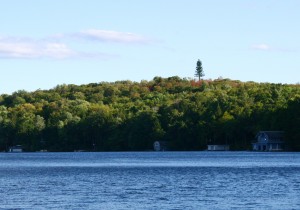Muskoka was, at one point, a place of quintessential relaxation.
Judi Brouse, the director of the Muskoka Watershed Council, an organization that studies the general health of the lakes, says the water is what brings people to the region.
“People come to Muskoka to decompress,” she says. “They’re drawn to water to relax.”
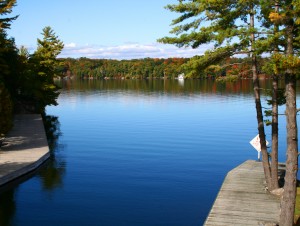
Muskoka’s big draw has always been its freshwater lakes, which are some of the cleanest in the world.
Photo by Erin Morawetz
And that’s how it has always been.
The settlers who were successful at running hotels were the lucky ones who had land on the lakefront. And peace and serenity came with that.
But according to doctoral student Andrew Watson, there’s “nothing left of wilderness anymore.”
“When Muskoka resorts were in their heyday, there were barely cottages anywhere,” he says. “They barely registered on most people’s panoramic view of the lake.”
“Now anyone who comes to a resort has to deal with cottages everywhere.”
Indeed, Brouse says the density of cottages right along the shorelines is that of a subdivision.
And most of the cottages that exist today are “cottages” in name only. Many of them are what people refer to as “monster cottages” or “McMansions”: oversized homes with manicured lawns, multiple bed and bath rooms, and all the amenities of a house in a Toronto suburb.
Of course, there always were some big cottages. The area around the old Beaumaris hotel is historically known as “Millionaire’s Row,” for it is where the biggest and most extravagant cottages of the turn of the century were built.
But those cottages now pale in comparison to most others on the lakes, and the idea that a cottage is worth a million dollars? No longer anything of note.
Diane McKee, a Muskoka real estate agent who has been in the industry for 25 years, says one of the greatest changes she’s seen over the years is the price point.
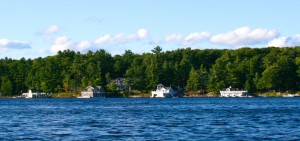
It’s hard to find a stretch of shoreline in Muskoka today that isn’t dotted with cottages and boathouses.
Photo by Erin Morawetz
“In 1998, I sold a property that was then the most expensive property ever sold in Muskoka, which was $4.3 million,” she says. “$4.3 million these days is not an uncommon number, and (it goes) beyond that.”
Muskoka has also been branded as a playground for the rich, particularly because of some of its famous cottagers.
In 2005, the New York Times called Muskoka the “Malibu of the North,” noting the many celebrities that have taken to the forest-lined lakes for their summer holidays: Goldie Hawn and Kurt Russell, Martin Short, and Steven Spielberg have all been known to be spotted around Muskoka, not to mention many professional hockey players.
And Muskoka is often a part of Hollywood gossip. In summer 2012, rumours swirled that Justin Bieber had purchased “Old Woman Island,” a $13.9-million-dollar property that McKee was showing that included a five-slip boathouse, a fully-equipped gym, and a yoga pavilion.
“$4.3 million these days is not an uncommon number, and (it goes) beyond that.”
Unfortunately for Muskoka-based ‘Beliebers’, McKee insists this was “just a rumour.”
“I never even showed it to him. I did have to field a lot of phone calls, though!” she laughs, referencing popular Hollywood gossip magazines and blogs.
But according to McKee, the multi-million dollar purchase prices have meant a change in clientele.
“When I first was in the business, a lot of our clients were small businessmen, doctors, lawyers, people like that,” she says. “These days, very few of those people can afford to be in the type of places they want to be on these lakes. It’s gone out of their range.”
Indeed, Judy Embleton, who spent years coming up to Pinelands Resort with her family, says they chose to go the resort option because buying—and even renting—was too expensive for her family.
“I have never, ever had the cottage experience,” she says. “The resort experience is what we have, unless we win the lottery!”
Click through to see some of the mansions dotting the lakes of Muskoka. Photos by Erin Morawetz.
McKee says many of her clients are in the “money management” industry, or at the very least the top professionals in their field of choice, and anyone in Muskoka now without that kind of earning power is likely to have been there for several generations. But even longtime families are not guaranteed their little piece of heaven, as the massive homes have driven property taxes up significantly in recent years. She’s even seen it on the property her family owned for years.
“There’s nothing left of wilderness anymore.”
“Back in the ’70s, it was probably $1,000 a year on our cottage, which had a lot of shoreline,” she says. “Taxes on it today are over $15,000 on the same property.”
Desperate to keep their longtime family properties, many families have been forced to sell off parts of their lots or rent their cottage for parts of the summer. Some have simply been pushed out.
And with a change of people comes a different mentality.
Tilly Mann has been cottaging on Pine Island in Lake Muskoka for 62 years, ever since her parents bought a cottage when she was 15 years old. She sits out on her dock every morning drinking coffee, as she has for six decades, during which time she has seen a lot of changes.
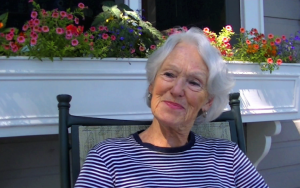
Tilly Mann says one of the things she has enjoyed the most about Muskoka over six decades is its serenity, a serenity that may be threatened by big boats and too many cottages.
Photo by Erin Morawetz
“People come and they build (the big cottages) but they didn’t grow up here, their children didn’t grow up here,” she says. “They stay three or four years and then put (the cottage) back on the market.”
“There isn’t the connection with Muskoka.”
Randy Potts, owner of Sunset Cruises, has restored two old Muskoka boats to give tourists and cottagers an authentic tour of the lakes. But he says many of the people he brings around the lakes on his tours have very little interest in the natural landscape around them.
“When I take people on a cruise, I purposely try to hunt down areas that are less developed and give people a little more of the natural beauty that is Muskoka,” he says. “When it comes to architecture, I try to show off some of the older homes. Sometimes you get people on the boat who really couldn’t care less about either, so I drive by all the hockey players’ and movie stars’ cottages.”
“I try not to, though, because it stands against everything I believe in. That isn’t what makes Muskoka special.”
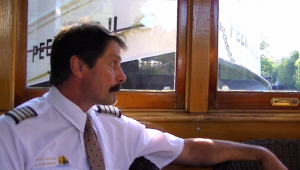
Randy Potts says despite some cruisers’ waning interest in Muskoka’s natural landscape, he enjoys giving tours of Muskoka so much it doesn’t even feel like work.
Photo by Erin Morawetz
But for Potts, what does make Muskoka special is slowly shrinking away.
“The Muskoka I grew up with is disappearing,” he says. “To an awful lot of people, Muskoka is rocks, trees, and water: beautiful clear lakes, lots of rugged rock, and pine trees as far as the eye can see. That’s slowly changing and being replaced with miles of boat houses and development.”
Joan Booth, the former president of the Muskoka Lakes Association, a cottage association that especially promotes conservation of Muskoka’s environment, shares a similar sentiment.
“The Muskoka of today is crazy,” she says. “A lot of the people who are buying the mega-million-dollar cottages here now don’t really care about Muskoka the way the old-timers did, when it was pristine and they tried to keep it pristine.”
“It’s more about toys and big cottages and who’s got what.”
And Brouse says this lack of interest in the natural environment of Muskoka can actually have negative repercussions on the water.
“The people who have historically come up, those families came up all summer,” she says. “They were attached. And those families that still have cottages have a real deep-rooted attachment to Muskoka as a natural area and what that means to them.”
“People that buy a cottage and look at it as a second home and it’s a permanent structure and they come in for two days and leave for three or four weeks, they don’t have that same attachment to the ground, and to the land, and to the water,” she says. “They see it very much as a playground and not as a place where they’re living. And so they look after it differently. Their expectations of what they’re doing are different. And it impacts how they use the water.”
According to Brouse, one of the biggest adverse effects on lakes is increased levels of phosphorus, which is a nutrient for algae for lakes on the Canadian Shield: the more phosphorus in the lake, the more algae.
While most of Muskoka’s many lakes have reasonable phosphorus levels at the moment, it hasn’t always been the case. In fact, Three Mile Lake, just east of Lake Rosseau, was over the threshold for phosphorus in 2005, resulting in a large patch of green algae in the centre of the lake and a warning to steer clear of the water until tests could be done.
Manmade phosphorus comes from septic systems, as well as lawn fertilizers and phosphates being used in cleaning products, shampoos, etc. Though Brouse is quick to say that not everyone is like this, she does make the point that many owners of newer, “monster cottages” are at least using lawn fertilizers and clearing away natural brush that can stop phosphorus from reaching the lake.
“They see it very much as a playground and not as a place where they’re living. And so they look after it differently.”
And Brouse says an increase in boat traffic, as well, can cause erosion on the shoreline, eventually leading to the degradation of fish habitats in the water and harming the natural balance of the watershed.
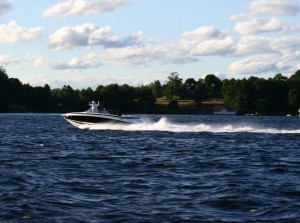
Large boats are becoming more and more commonplace on the Muskoka lakes, their waves causing erosion on the shorelines.
Photo by Erin Morawetz
“It’s the waves,” she explains. “So especially if you’re getting into some of these big boats, wakeboarding, kneeboarding, and you’re creating big waves with a lot of energy that really pound away at the shore. They start undercutting roots and plants and trees.”
Not to mention the incessant whine of outboard engines.
Mann notes that the noise from boat traffic around Pine Island has increased significantly over the years she has been cottaging. And Brouse says the Muskoka Watershed Council gets a lot of complaints about the visuals of massive cottages—that they’re disrupting the peace. In a sense, large cottages, and all the “toys” that come along with them, are taking away from what Muskoka was originally—a quiet retreat from the city.
Of course, some people still take value in Muskoka’s original intent.
Magda Seydegart has maintained her family’s cottage the way it has been for 60 years, which means no electricity. Despite the wishes of her husband and grown kids, she insists the cottage remain that way so as to preserve the unique, tranquil quality of the area.
“I don’t want it,” she says about electricity. “I don’t want to come up here and do the exact same things I do in the city. I want to play board games. I want to swim and be outside and canoe and stop being addicted to my communication devices.”
For Potts, the age of wireless communication has played a very large role in Muskoka’s shift from calm to cosmopolitan.
“There used to be the ability to re-energize, recharge your batteries in Muskoka. It used to be peaceful,” he says. “With the advent of the wireless age, when people can live at the cottage and do their work, it completely reduces, if not eliminates, the reason for the cottage: to recharge your batteries, to return to some sense of calm, normalcy.”
Potts says many people who step aboard one of his boats for a cruise never even take their eyes off their phones—that is, unless they’re on long enough.
“If they’re only on for up to an hour and a half, chances are they never turned them off,” he says. “It’s like there’s this magic dome over the boat after an hour and a half, like they’ve inserted a little bit of life into them, a “shot” of Muskoka.”
“If you could bottle Muskoka, it would be the hottest selling item at the liquor store.”
“It’s more about toys and big cottages and who’s got what.”
And Seydegart and Potts are not alone. The 2013 Cottage Life Real Estate Report shows that respondents’ top four favourite aspects of a cottage are peace and quiet, campfires, coffee on the dock, and jumping off the dock. Simple pleasures.

The downtown streets of Port Carling are packed with vacationers all summer long, especially on weekend days like this Saturday in August 2012.
Photo by Erin Morawetz
But with neighbours roaring around on wakeboard boats or relaxing in their hot tubs where the water has nowhere to go but the lake, there is not much one can do to maintain the peacefulness of the area or the good quality of the lakes.
And then there are the sheer numbers—in the District of Muskoka, there are 20,000 seasonal cottages, which means 76,000 seasonal residents. In the Township of Muskoka Lakes alone, the population increases from under 7,000 in the spring to over 31,000 in summertime. As John Arblaster, owner of Ella’s Place, a restaurant in Port Carling, puts it, “This place turns into Coney Island in the summer!”
And though municipalities are cracking down on maximum sizes of cottages and boathouses, there is no doubt that the presence of McMansions has changed the clientele and the landscape, both physically and metaphorically, taking away from the tranquility, the serenity, and the natural quality of yore.
